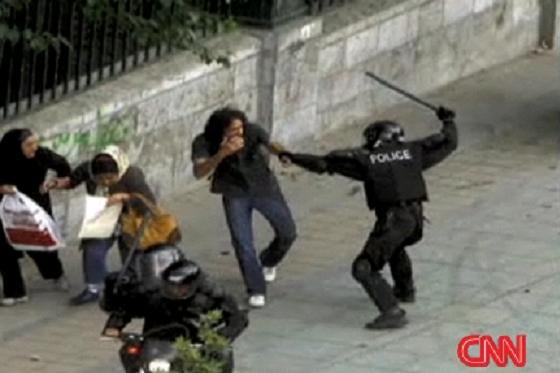
The BBC’s permanent correspondent in Tehran, Jon Leyne, has been ordered to leave the country as part of a widespread crackdown on foreign reporting by the Iranian authorities.
The Fars news agency said Leyne had 24 hours to leave Iran and that officials had accused him of “dispatching fabricated news and reports, ignoring neutrality in news, supporting rioters and trampling the Iranian nation’s rights”.
Iranian authorities have arrested 23 journalists and bloggers since post-election protests began a week ago, according to press freedom campaign group Reporters Without Borders.
RSF said reporters were a “priority target” for Iran’s leadership. Among those arrested was the head of the Association of Iranian Journalists.
“It’s becoming more and more problematic for journalists,” said Benoit Hervieu of the Paris-based group.
The group released a list of 23 Iranian journalists, editors and bloggers arrested since 14 June, and said it had lost contact with several others believed to have been detained or in hiding.
Hervieu said RSF verified each arrest via its network of reporters and activists in Iran. No foreign journalists were on the list. The reasons behind the detentions remain unclear.
Iran’s authorities have long kept a close eye on local and international media operating in the country, and clamped down as protests engulfed Tehran last week over the 12 June presidential election, the biggest challenge to the cleric-led government in 30 years.
President Mahmoud Ahmadinejad was declared the landslide winner, but supporters of reformist challenger Mir Hossein Mousavi say fraud was widespread.
Authorities have banned foreign media from reporting from the street and allow only phone interviews and information from officials sources such as state TV.
Many websites have been blocked. Iran is particularly sensitive about news reports, blogs and internet reports in Farsi.
“The regime has been visibly shaken by its own population and does not want to let this perception endure,” RSF said in a statement.
Detained
Ali Mazroui, the head of the Association of Iranian Journalists, was arrested yesterday. Also detained is Mohammad Ghochani, editor of Etemad Meli, owned by opposition presidential candidate Mehdi Karoubi.
Others detained include a blogger known as the “Blogging Mullah”, a cartoonist, a TV producer, the publisher of several newspapers, a disabled former newspaper editor and a business reporter.
Nakhle Elhage, news director at Dubai-based Al-Arabiya television network, said authorities told them their activities have been suspended until further notice but did not ask their resident correspondent Diaa al-Nasseri – an Iraqi – to leave.
Last Sunday, Al Arabiya in Tehran was told by the authorities to suspend their activities for one week.
RSF said that, even before the election, Iran held more journalists and cyber-dissidents in jails than any other country in the Middle East.
Hervieu said blogs, Twitter, YouTube and other internet methods are the only way most people can convey information from the street.
But the use of anonymity by blog posters trying to avoid repercussions makes information difficult to verify.
Many of those posting “are both spectators and activists,” blurring lines of impartiality, he said.
He said small digital cameras passed from activist to activist and then to a foreign colleague or news organisation are helping spread images, though their provenance is not always clear.
He noted the example of the much-viewed amateur video on YouTube, showing dozens of Iranians running down a street and shouting “Allahu Akbar” after police fired tear gas.
Reporters were also restricted during the 1979 Iranian Revolution, which saw the installation of the Islamic regime in power today.
The US-based news magazine Newsweek said its journalist Maziar Bahari was arrested this morning and had not been heard from.
Iranian foreign minister Manouchehr Mottaki held a news conference at the weekend in which he rebuked Britain, France and Germany for raising questions about reports of voting irregularities.
He saved his most pointed criticism for Britain, raising a litany of historical grievances and accusing the country of flying intelligence agents into Iran before the election to interfere with the vote. The election, he insisted, was a “very transparent competition”.
That drew an indignant response from foreign secretary David Miliband, who “categorically” denied Britain was meddling.
“This can only damage Iran’s standing in the eyes of the world,” Miliband said.
Email pged@pressgazette.co.uk to point out mistakes, provide story tips or send in a letter for publication on our "Letters Page" blog
